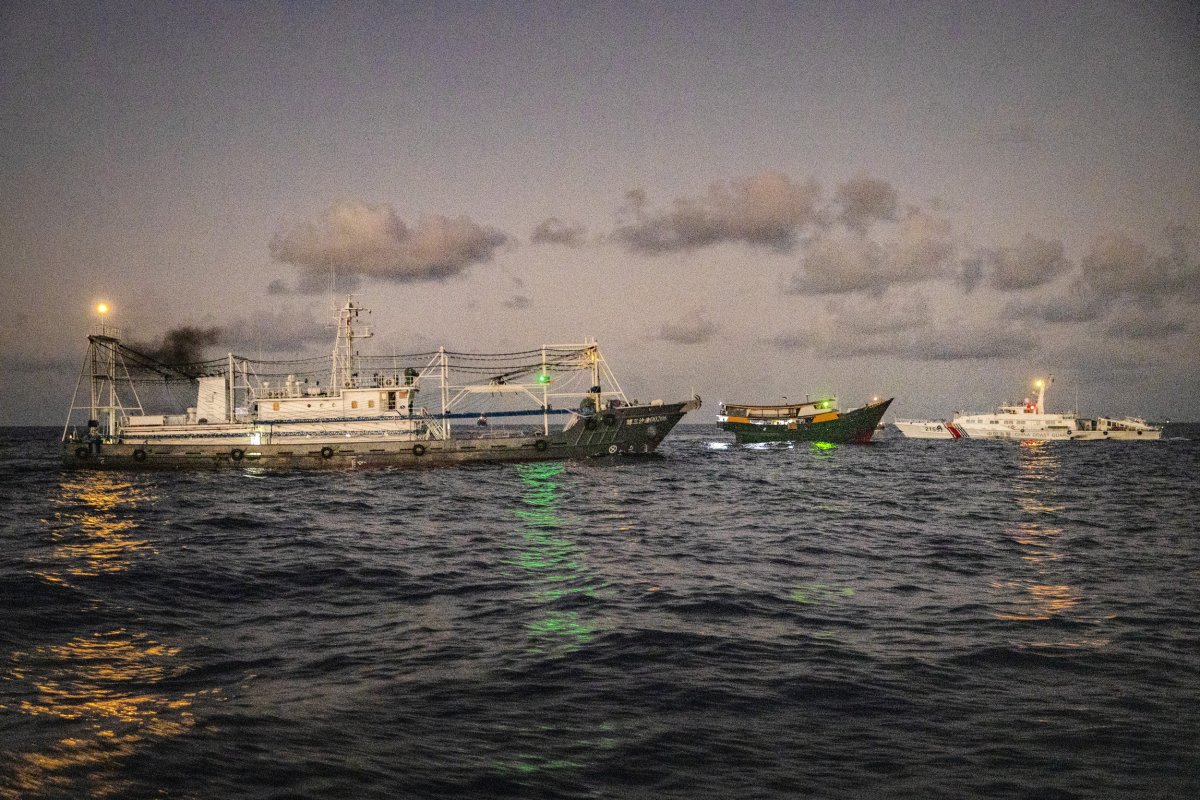Chinese state media warned the Philippines, a United States ally, in an editorial on Saturday that the country will suffer "losses" as tensions grow in the South China Sea.
Last Saturday, the Philippine supply boat Unaizah May 4 and its coast guard escorts were met with an attempted blockade and water cannon attacks by China while carrying supplies and a rotation of marines to the BRP Sierra Madre, which serves as an outpost on Second Thomas Shoal, a hotspot in the Spratly Islands archipelago. The water cannons disabled the supply boat and caused multiple injuries to those onboard, according to Manila.
China claims sovereignty over Second Thomas Shoal, as it does most of the South China Sea, despite the fact the feature sits within the Philippines' internationally recognized exclusive economic zone (EEZ) and over 600 miles from Chinese shores.
The Global Times, a nationalistic English-language tabloid published by the propaganda department of the ruling Communist Party, defended China's actions as "reasonable, legal, and necessary to defend its rights."
These comments echoed the remarks of Chinese Ministry of National Defense spokesperson Wu Qian on Sunday, who said, "The China Coast Guard regulated, stopped and drove away Philippine vessels in accordance with laws and regulations, and resolutely smashed Philippine attempts to infringe on rights and provoke."
Chinese embassy spokesperson Liu Pengyu told Newsweek via email on Saturday afternoon: "In May 1999, the Philippines illegally grounded a tank landing ship, Sierra Madre (LT-57), at Ren'ai Jiao, in grave violation of China's territorial sovereignty...The Philippines promised several times to tow it away as soon as possible, but over 20 years have passed and the Philippines' warship is still sitting there."
Liu added: "The Philippines repeatedly intrude into the adjacent waters of Ren'ai Jiao in the name of resupply of necessities, attempting to build a permanent outpost on China's uninhabited reef so as to permanently and illegally occupy Ren'ai Jiao. The Philippines has gone back on its own words, refused to fulfill its commitment, repeatedly broken its promise made to China and severely violated Article 5 of the Declaration on the Conduct of Parties in the South China Sea."
The Global Times, whose views do not always reflect official policy in China, claimed that Manila is playing the victim card after Philippine President Ferdinand Marcos Jr. said on social media on Thursday that the country would roll out countermeasures that would be "proportionate, deliberate, and reasonable in the face of the open, unabating, and illegal, coercive, aggressive, and dangerous attacks by agents of the China Coast Guard and the Chinese Maritime Militia."

In its editorial, the Global Times claimed that U.S. support of the Philippines has "fueled their inner resistance against a stronger opponent, clouding their judgment and increasing their provocative and risky behavior."
U.S. Department of Defense (DOD) Secretary Lloyd Austin, in a call with Philippines counterpart Gilberto Teodoro on Wednesday, reaffirmed that the "ironclad" U.S.-Philippines Mutual Defense Treaty extends to anywhere in the Pacific, including in the South China Sea.
The Global Times wrote that the Philippines is in a "very dangerous position" and warned that promises made by the U.S. are "grand but cheap."
"It is clear that Washington will not fight a war for the Philippines in the South China Sea. If it comes to a day when conflict is sparked accidentally, it will be Manila that suffers losses," the newspaper's editorial reads.
When asked if the U.S. will provide Navy or Coast Guard escorts to the Philippines, a DOD spokesperson told Newsweek via email on Saturday: "I don't have a comment on future operations, but we've been very clear on our concerns that these actions are dangerous and destabilizing. We'll continue to stand with one of our oldest allies. The United States is committed to maintaining deterrence, peace, and stability — and we're equally committed to doing so alongside our Allies and partners."
The Chinese newspaper blamed the Philippines for the two countries' strained relations and wrote, "The escalation of tensions in the South China Sea is not something that countries cherishing regional peace and stability would like to see. Therefore, it is necessary for all parties to exercise restraint."
The Global Times wrote that "China has always exercised great restraint and patience toward the Philippines," and that relations between the two "are at a critical juncture that urgently requires rationality and sobriety. The Philippines must act with caution on which path to take."
Newsweek reached out to the Chinese foreign ministry, as well as the Philippines' foreign ministry via email for comment. It also reached out to the DOD via email for comment.
Update 3/30/24, 11:07 a.m. ET: This article has been updated with comment from the U.S. Department of Defense.
Update 3/30/24, 3:11 p.m. ET: This article has been updated with comment from the Chinese embassy.
Uncommon Knowledge
Newsweek is committed to challenging conventional wisdom and finding connections in the search for common ground.
Newsweek is committed to challenging conventional wisdom and finding connections in the search for common ground.
About the writer
Rachel Dobkin is a Newsweek reporter based in New York. Her focus is reporting on politics. Rachel joined Newsweek in ... Read more
To read how Newsweek uses AI as a newsroom tool, Click here.






